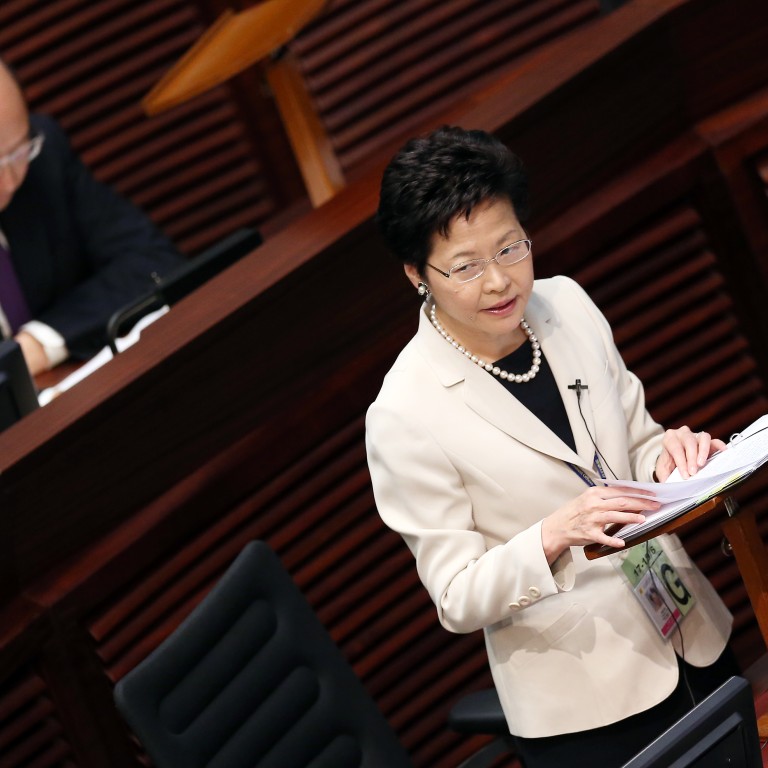
Hong Kong lawmakers reject bid to set up select committee to probe lead-in-water scandal
Legislators today voted down two motions seeking the creation of a select committee to investigate the lead-in-water scandal in housing estates and schools.
The motions, put forward by pan-democrats Cyd Ho Sau-lan and Gary Fan Kwok-wai, were rejected by 36 votes to 25. One lawmaker did not vote.
They were supported by lawmakers representing geographical constituencies in a 16-13 vote, but failed to pass in functional constituencies, where 23 members voted against the motions and nine backed them.

It would be a waste if we spent public money on something that would end with no results
On the second day of debate on the issue, government officials and allied legislators accused pan-democrats of “politicising” the matter.
Pro-government lawmakers noted that three other inquiries had been set up to examine the matter. They said a fourth would cause overlapping of duties.
One of them, Paul Tse Wai-chun, said it was not worth “investing” in Legco’s own inquiry because three other panels were aleady examining the matter and the tenure of the current legislature would end in nine months’ time.
“It would be a waste if we spent public money on something that would end with no results,” Tse said. He added that lawmakers should instead focus on their “legitimate business” of scrutinising legislative proposals.
Tam Yiu-chung of the Democratic Alliance for the Betterment and Progress of Hong Kong said investigations by a Legco select committee would be prone to political influence.
Cyd Ho Sau-lan rejected Tse’s claims, saying monitoring the administration was the legislature’s job as stated in the Basic Law. She also said a Legco inquiry was aimed at finding out if any departments or officials should take responsibility for the scandal.
Ho said she agreed that problems in the monitoring system for construction projects played a part in the scandal. But she said: “That does not mean there is no need to identify who is responsible.”
Her pan-democrat colleague, Joseph Lee Kok-long, who represents the health services sector, supported Ho’s motion, saying there would be no overlapping of work. “The three other inquiries focus on the cause, while a Legco inquiry would examine responsibility issues,” Lee said.
Chief Secretary Carrie Lam Cheng Yuet-ngor said in her closing speech that pan-democrats had been “politicising” the scandal and “exaggerating” its seriousness by saying the public was “drinking toxic water”.
[Their demands] would significantly affect our work in conducting tests in other estates and facilities
She also said pan-democrats had made undue demands, such as asking for water tests for every unit in an estate and for blood tests for all Hongkongers.
“[Their demands] are not only unscientific but would also significantly affect our work in conducting tests in other estates and facilities,” Lam said.
“Imagine if the government had bowed to political pressure to conduct water tests in every flat. The tests in Kai Ching Estate would very likely still be unfinished by now,” she said.
Lam said 4,740 water samples had been taken from housing estates completed after 2005. Of them, only 91 samples were found to contain lead above the World Health Organisation standard of 10 micrograms per litre, she said.
The scandal was first exposed by Democratic Party legislator Helena Wong Pik-wan in July when drinking water samples from Kai Ching Estate in Kowloon City were found to exceed the WHO standard.
Government tests have uncovered excessive lead levels in the water of 11 public housing estates, one private residential development, three primary schools and three kindergartens.
Separately, the Housing Authority’s building committee today approved the spending of HK$1 billion to fill a budget overrun caused by the lead-in-water scandal.
The extra money was needed for four public housing projects after four building contractors involved in the scandal were barred from bidding as a punishment. As a result, the authority did not choose the lowest bids.
